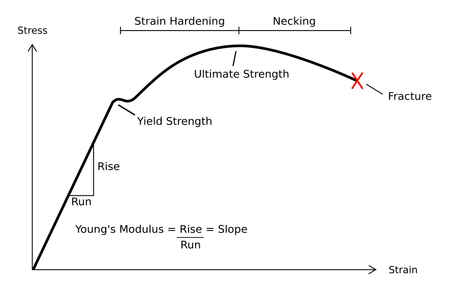Page 2 of 2
Re: Piston Engine: Horsepower + Torque
Posted: Fri Feb 26, 2016 8:48 pm
by Colonel
This is tough to describe in words.
First thing to learn is that 80% of
the torque applied is used to overcome
friction, so dry vs oiled threads is very
important.
The next thing to learn is that torque
as a function of degrees of rotation is
like a hockey stick. As soon as you
hit the inflection point on the curve
you are where you want WRT stretch.
Oh yeah - always use a flat washer
with the nut - and don't reuse flat
star lock washers.
Re: Piston Engine: Horsepower + Torque
Posted: Fri Feb 26, 2016 8:55 pm
by Strega
When you tighten a nut on a bolt, you are actually applying a preload to the bolt..the actual preload applied is much more important than the torque of the nut.
I actually made a jig to measure the bolt stretch on connecting rod bolts (used a dial indicator) ...
Ever wonder why in a lot of german and japanese service manuals there is a small torque spec, and then a "rotational" spec?
Im sure all the avcan experts here like Mr Crunch will tell you Im wrong though,
Re: Piston Engine: Horsepower + Torque
Posted: Fri Feb 26, 2016 10:22 pm
by woodzi
Correct. The torque specified is that which is theoretically required to reach the preload you want. That is why lubricated vs. dry is important.
The preload is important because the whole idea is to keep the parts together and sealed and to avoid fatigue failure of the fasteners.
Re: Piston Engine: Horsepower + Torque
Posted: Fri Feb 26, 2016 11:01 pm
by Colonel
This is probably too much detail but ...
First we start with Young's Modulus and a stress vs strain graph

When we distort a material it is elastic at first - it will bounce
back after the load is removed
However if we continue to increase the load the deformation is
plastic - the material permanently yields, even after the load is
removed
Against that backdrop ... I aim for elastic deformation (stretch)
of the fastener - it can be reused. I can feel the elastic stretch
of the fastener in my fingertips. So can any master mechanic,
whom also doesn't need a torque wrench.
With plastic deformation of the fastener you must check against
the Table Of Limits in the Overhaul Manual to see if the fastener
(eg through bolt) is still serviceable.
Some fasteners like connecting rod bolts are "use once".
If you understand basic strength of materials (1st year
engineering) the rest is obvious.
https://en.wikibooks.org/wiki/Strength_of_Materials
Re: Piston Engine: Horsepower + Torque
Posted: Sat Feb 27, 2016 4:07 pm
by Colonel
[b]Re-use Of Fasteners[/b]
This is a terribly important topic, and you
need to learn about it from someone who
knows a lot more about it than I do.
Here are some rules I live by, which are
sure to enrage the AME's:
- flat washers can generally be re-used
as long as they are not scarred or distorted.
Always use at least a flat washer with a nut.
For non-structural applications, I have
had great success using those clear plastic
washers to stop screws vibrating loose.
- never re-use a flat star lock washer,
either internal or external. They are
"use-once" like a condom.
Typically a lock washer will be used with
a flat washer (eg on a magento stud) to
reduce the probability of the nut backing off.
Always replace star lock washers with new
and throw the old ones in the garbage.
Don't let the homebuilders get ahold of them.
- split ring lock washers can be re-used
as long as they are not squished flat.
Like a new pair of tits, they must be
perky.
- fiber nuts and metal stop nuts can be
re-used as long as they [b]retain adequate
tension[/b]. Any doubt in your mind, toss
them in the garbage. Keep a good stock
of new ones on hand, in common sizes.
Be aware that fiber nuts in high heat
areas (eg forward of firewall, landing
gear) will have a shortened life and will
probably need replacement each time.
Try not to use fiber nuts in high heat areas
but depressingly, engine and airframe
manufacturers do. Look at a new airplane
sometime with the cowl off.
- bolts can generally be reused as long
as they have not suffered plastic deformation
and if used with metal stop nuts, have
adequate meat left on the threads.
Again, any doubt in your mind, toss it in the
garbage and use a new one. Again, the key
is to have a good stock of common AN hardware
on hand.
